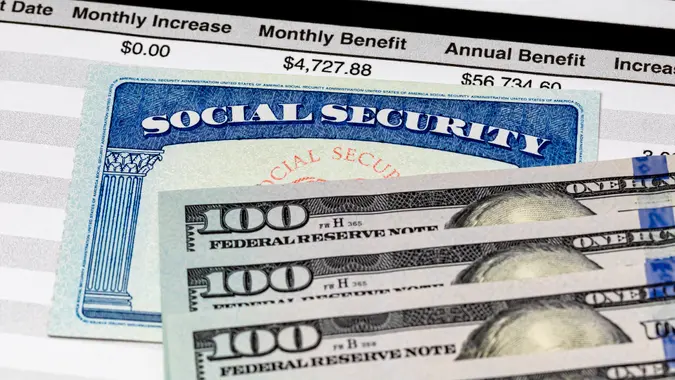Social Security: 9 Things Most Retirees Don’t Know About Their Benefits

Commitment to Our Readers
GOBankingRates' editorial team is committed to bringing you unbiased reviews and information. We use data-driven methodologies to evaluate financial products and services - our reviews and ratings are not influenced by advertisers. You can read more about our editorial guidelines and our products and services review methodology.

20 Years
Helping You Live Richer

Reviewed
by Experts

Trusted by
Millions of Readers
Social Security is a valuable program that ensures retirees have a bit of guaranteed income to rely on in their golden years. However, many Americans don’t understand how it works.
Key findings from a 2023 MassMutual quiz about basic Social Security retirement benefits revealed 69% of respondents failed or barely passed. One-third, 34%, passed with a D grade while more than one-third, 35%, failed the quiz.
Thoroughly understanding the ins and outs of Social Security will ensure you are able to take full advantage of your benefits and avoid leaving any money on the table. Here are facts about Social Security that you may not be aware of.
Social Security Isn’t Going To Disappear
Many Americans worry that there will be no Social Security benefits available by the time they retire. While there is some conflicting information available online about when Social Security Trust Fund reserves may be depleted, it’s projected that funds will be depleted by 2034.
“This fear causes many people — to their detriment, most likely — to start collecting benefits as soon as they’re able to so they can get it while it lasts,” said Taylor Jessee, CFP and the director of financial planning for Taylor Hoffman Wealth Management.
However, Social Security is largely funded by payroll taxes, which will continue to be collected for the foreseeable future. And if the fund does end up depleted, recipients will still receive a portion of their benefits.
“I caution today’s retirees that Social Security is likely not going away any time soon,” Jessee added.
Social Security Isn’t Enough To Live Off in Retirement
Most people cannot live on Social Security alone. Data from the SSA shows these benefits only will replace about 40% of your pre-retirement earnings.
“Nonetheless, Social Security benefits are still valuable, so you’ll want to do whatever you can to maximize them,” said Jackie King, a financial advisor at Edward Jones.
The more you invest in a retirement plan, such as a 401(k) or IRA, the more flexibility you’ll gain in managing your retirement costs, because you’ll have more sources of income to pair with Social Security.
“Try to contribute as much as you can afford to these plans,” King recommended.
Benefits Are Based on Your Highest 35 Years of Earnings
Are you worried that several years on a lower salary will negatively impact how much you receive in Social Security benefits?
The good news is that the formula for calculating your benefit is based on your 35 highest-earning years, as well as the age you begin taking Social Security, according to King.
If you’re curious to know how much you’re projected to get, she said you can sign up to receive a yearly statement from the Social Security Administration that provides an updated estimate.
You Will Receive Greater Social Security Benefits If You Wait To Claim It
The longer you wait to take Social Security, the more money you’ll receive.
You can claim these benefits as early as age 62, for a reduced benefit. Waiting until your full retirement age means you’re entitled to 108% of the monthly benefit. If you choose to delay your retirement until age 70, the SSA said you’ll get 132% of the monthly benefit.
However, waiting as long as possible to claim your benefits isn’t always the best decision for every retiree. It’s a good idea to evaluate all of your options for when you can start claiming these benefits.
Your Ex-Spouse May Receive Benefits
What if you are divorced?
According to the SSA, your ex-spouse may receive benefits if the marriage lasted for 10 years or longer, your ex-spouse is unmarried, your ex-spouse is age 62 or older and you are entitled to Social Security retirement or disability benefits.
You Get To Keep the Bigger Benefit If Your Spouse Dies
If both spouses receive Social Security benefits, the smaller benefit goes away when one person dies. It doesn’t matter who dies first — the surviving spouse will begin receiving the larger of the two benefits.
“That is why couples should focus on increasing the higher benefit,” said Jeremy Keil, a retirement-focused financial planner with Keil Financial Partners and host of the Retirement Revealed blog and podcast. “It’s the one that will stay around longest and be there to help the widow(er).”
Some of Your Benefits May Be Withheld
If you claim your benefits before reaching full retirement age, are still working and make more than the yearly earnings limit, you may have some of your Social Security benefits withheld.
The cap is $22,320 for 2024, and you would lose $1 in benefits for every $2 in earnings above the max if you are under full retirement age.
But you don’t really lose the benefit.
“You won’t receive it while you are below full retirement age, but as soon as you hit that age, Social Security will recalculate and give you credit for those dollars,” Kell explained.
You Can Undo a Social Security Benefits Claim Decision
If you decided to claim your benefits and then realized you should have waited, the Social Security Administration allows you to withdraw your application for a one-time do-over.
“There are a host of reasons why someone may regret the decision to begin taking Social Security,” said Jordan Kahn, a CFA and chief investment officer for HCR Wealth Advisors.
For example, you could decide to take on a part-time job and no longer need the extra income. Or maybe you didn’t realize how much more money you could receive by waiting a couple more years.
“If a person makes this determination within 12 months of filing their initial application, they can stop receiving benefits and move forward as if they never claimed them,” Khan said.
However, you would still be obligated to pay back any benefits you received during that time.
You May Have To Pay Taxes on Social Security Benefits
Many Americans pay taxes on their Social Security benefits. The exact amount you’ll need to pay depends on your total income.
“It does not take a lot of income for your benefits to be taxed,” Kahn said.
As outlined by the SSA, if you’re a single filer, or individual, and have a combined income between $25,000 and $34,000, you may have to pay income tax on up to 50% of your benefits. If you earn more than $34,000, up to 85% of your benefits may be taxable.
For joint filers, if you and your spouse have a combined income that is between $32,000 and $44,000, you may have to pay income tax on up to 50% of your benefits. If your combined income is more than $44,000, up to 85% of your benefits may be taxable.
In addition to paying federal income tax on your benefits, Kahn said 12 states also levy income tax on Social Security benefits. These states include Colorado, Connecticut, Kansas, Minnesota, Missouri, Montana, Nebraska, New Mexico, Rhode Island, Utah, Vermont and West Virginia. An article from USA Today said while West Virginia is not always included in this list, your Social Security benefits will be taxed in this state if your income is $50,000 or more for single filers or $100,000 or more for couples filing jointly.
If you’re worried about your tax bill in retirement, it’s a good idea to speak with a financial professional who can help you find ways to lower your taxable income.
Heather Taylor contributed to the reporting for this article.
More From GOBankingRates
 Written by
Written by  Edited by
Edited by 
























